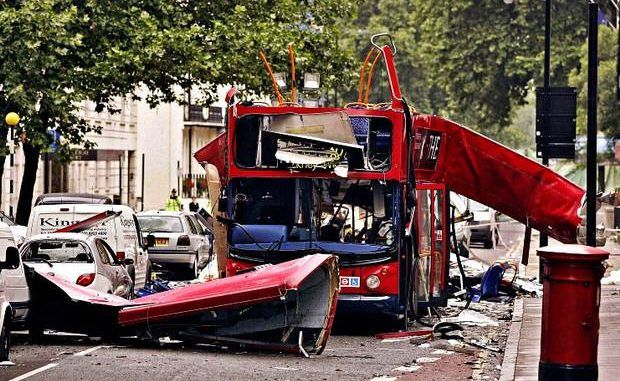
It has been a decade since the 7/7 London bombings, and the world is still recovering.
According to a special report by RT.com [1]:
“Its roots are not superficial, but deep, in the madrassas of Pakistan, in the extreme forms of Wahabi doctrine in Saudi Arabia, in the former training camps of Al-Qaeda in Afghanistan; in the cauldron of Chechnya; in parts of the politics of most countries of the Middle East and many in Asia; in the extremist minority that now in every European city preach hatred of the West and our way of life.”

BYPASS THE CENSORS
Sign up to get unfiltered news delivered straight to your inbox.
You can unsubscribe any time. By subscribing you agree to our Terms of Use
“It is founded on a belief, one whose fanaticism is such it can’t be moderated. It can’t be remedied. It has to be stood up to.”
Those were the words of then-Prime Minister Tony Blair, in the immediate aftermath of the July 7, 2005, bombings in London [2].
His speech, condemning jihadist extremism, was part of the rhetoric already entrenched in the so-called “War on Terror” which had gripped the US and Britain since the September 11, 2001 attacks on New York and Washington. But now they were spoken on home soil, they were relevant to citizens of the UK and to all those in London fearing another attack on public transport.
Blair’s words, however, marked a turning point in the perception of British Muslim communities.
“Police were being very reticent with what they were saying,” said Azru Merali, a founder of the Islamic Human Rights Council, which monitors Islamophobia in the UK, in an interview with RT.
“[The police] were very careful, as were some of the media, and then Tony Blair came out with his speech … and all hell broke loose.”
“So it wasn’t what happened. It wasn’t the media or the police investigating [the bombings], it was Tony Blair about a day later causing problems.”
The four bombers, all British citizens, had killed 52 people when their suicide packs detonated on three underground trains and one bus. The eldest, Mohammad Sidique Khan, was 30. The youngest, Hasib Hussain, was just 18.
Blair’s speech, which branded Islamic extremism an “evil ideology” with “devilish logic,” was not the beginning of Islamophobia in Britain. As Merali notes, it is tempting to see such events as a starting point when in fact they are part of a “trajectory” of popular sentiment. But by saying the acts were “founded in belief,” Blair paved the way for a decade of confusion over terminology, and unwittingly gave prejudice a context and legitimacy, the effects of which are still apparent in contemporary political speeches.
Published in the autumn after the attacks, a report by the European Monitoring Centre on Racism and Xenophobia [3], an organization which will host Blair after his resignation as Middle East peace envoy, said the authorities were “optimistic” that levels of hate crime against Muslims would sink back to pre-7/7 levels following an initial spike.
Sources:
[1] http://rt.com/uk/271972-london-bombing-islamophobia-legacy/
[2] http://news.bbc.co.uk/1/hi/uk/4689363.stm
[3] http://fra.europa.eu/sites/default/files/fra_uploads/197-London-Bomb-attacks-EN.pdf
Latest posts by Royce Christyn (see all)
- Irish Slaves – What The History Books Will Never Tell You - November 1, 2017
- Government Op Who Predicted Super Bowl Score Warns Of Nuclear War - February 18, 2017
- Video: Why Voting Doesn’t Change Anything & Democracy Is A Lie - May 7, 2016


Be the first to comment